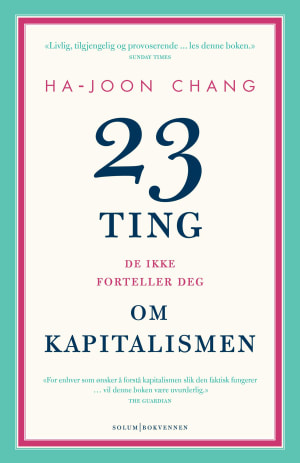
Thing 1: There is no such thing as free market.
Thing 4: The washing machine has changed the world more than the Internet.
Thing 5: Assume the worst about people, and you get the worst.
Thing 13: Making rich people richer doesn’t make the rest of us richer.
If you’ve wondered how we did not see the economic collapse coming, Ha-Joon Chang knows the answer: We didn’t ask what they didn’t tell us about capitalism. This is a lighthearted book with a serious purpose: to question the assumptions behind the dogma and sheer hype that the dominant school of neoliberal economists-the apostles of the freemarket-have spun since the Age of Reagan.
Chang, the author of the international bestseller Bad Samaritans, is one of the world’s most respected economists, a voice of sanity-and wit-in the tradition of John Kenneth Galbraith and Joseph Stiglitz. 23 Things They Don’t Tell You About Capitalism equips readers with an understanding of how global capitalism works-and doesn’t. In his final chapter, «How to Rebuild the World,» Chang offers a vision of how we can shape capitalism to humane ends, instead of becoming slaves of the market.
Ha-Joon Chang teaches in the Faculty of Economics at the University of Cambridge. His books include the bestselling Bad Samaritans: The Myth of Free Trade and the Secret History of Capitalism. His Kicking Away the Ladder received the 2003 Myrdal Prize, and, in 2005, Chang was awarded the Leontief Prize for Advancing the Frontiers of Economic Thought.
Hvorfor peker de økonomiske pilene nedover i Norge? I 2013 hadde vi den beste kombinasjonen av velstand, helse og lykke i verden. Så ble vekst . . .
Scandinavian countries have been praised for their high levels of welfare provision and their economic and social outcomes. It is true that they are successful . . .
From world-renowned economist Paul Collier, a candid diagnosis of the failures of capitalism and a pragmatic and realistic vision for how we can repair it. . . .
Dette er en veldig oppklarende bok og det er ikke vanskelig å se for seg at andre som snakker fornuftig om økonomi, geografi, historie og . . .
Brilliant and engagingly written, Why Nations Fail answers the question that has stumped the experts for centuries: Why are some nations rich and others poor, . . .
“If [ The End of Alchemy ] gets the attention it deserves, it might just save the world.” ―Michael Lewis, Bloomberg View Something is wrong . . .
In this highly readable and thought-provoking work, Nick Dyer-Witheford assesses the relevance of Marxism in our time and demonstrates how the information age, far from . . .
We are well aware of the rise of the 1% as the rapid growth of economic inequality has put the majority of the world’s wealth . . .
Thomas Pikettys bog «Kapitalen i det 21. århundrede» handler om økonomi, kapitalisme, ulighed, meritokrati og demokrati. Med «Kapitalen i det 21. århundrede» har Thomas Piketty . . .